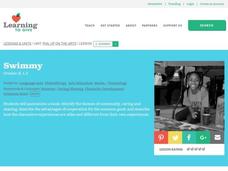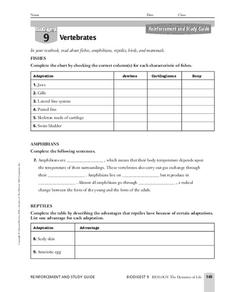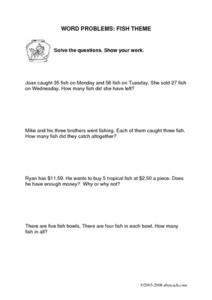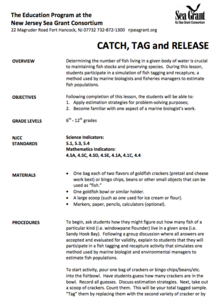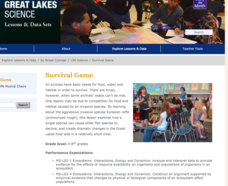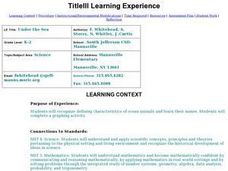Curated OER
Salmon Homing Instincts
Students identify the stages of the salmon life cycle. In this fish lesson, students experience first hand what it would be like to be a returning salmon attempting to identify a home stream by smell.
Curated OER
Swimmy
Students explore the themes of the book Swimmy by Leo Lionni. In this literacy lesson, students dramatize a character from Swimmy and identify common themes such as cooperation and caring. Students create a new ending to the story.
Curated OER
Designing a Study
Learners explore features to consider when designing a scientific study. In this science research lesson, students examine different methods of data collection and consider which method would be appropriate for determining how many types...
Curated OER
A Fish Tale
Students investigate the lives of fish. In this biology lesson plan, students demonstrate how fish cells respond to fresh and salty water, determine the age of a fish and if temperature effects the movement of a fish's operculum (gill...
Curated OER
Vertebrates
In this vertebrate learning exercise, students review the different adaptations for the 5 groups of vertebrates: birds, mammals, reptiles, amphibians, and fishes. This learning exercise has 12 matching, 1 fill in the blank, and 7 short...
Curated OER
How Many? Fishy Problems
For this math worksheet, learners solve 6 word problems in which they calculate the answer to a question about fish. Students do the necessary operation to solve the problem and then draw a picture that demonstrates the problem.
Curated OER
Fish, Amphibians, Frogs
In this science worksheet, students use basic scientific concepts to complete the series of puzzles that are intended to increase science literacy for telling the differences between fish and amphibians.
Curated OER
Freshwater Fish Water Quality
Sixth graders work together to complete an experiment about the quality of freshwater. In groups, they collect fresh water samples from a variety of sources and test the pH levels. After completing a KWL chart, they test the amout of...
Curated OER
Build-A-Fish
Students identify the basic external anatomy of a fish. After identifying the parts of the fish, students explain the function of each body part and how it is related to the whole. They discover how the shape of a fish help to propel it...
Curated OER
Catch, Tag, and Release
Learners discover how fish tagging is used by marine biologists and fisheries to estimate fish populations. Participating in a simulation, students use estimation to determine the whole population from a small number of items.
Curated OER
The Aquatic Environment
Fifth graders focus on the various types of fish living in different water environments. In groups, they research the different methods used to fish and participate in experiments to determine the effects of mercury on fish, the...
Curated OER
Adaptations of Fishes for Survival in Polar Environments
Students compare the anatomy of temperature and polar fishes. They explore the adverse effects of cold on metabolism and physiology and discuss how polar fishes adapt to their environments. Comparisons are also made to the DNA sequences...
Curated OER
Fish Stix
Students explore population biology. They describe and demonstrate
a visual census technique commonly used to survey reef fish populations. In addition, they analyze and interpret data from surveys of coral reef fish populations.
Curated OER
Sea-ing More Clearly
Students explore historical importance of fish as food source, examine works of Robert Harris, create their own fish, and compose accompanying poetry. Students then explore dramatic tradition of Chorus inspired by Greek theatre,...
Curated OER
Taha Moana - The Sea
Students discuss language, meanings and ideas in a range of texts related to the sea. They write instructions, explanations, arguments and factual accounts, express personal viewpoints on topics related to the sea.
Curated OER
Fish Adaptations and Habitats
Students explore specific adaptations and how they pertain to the survival of the individual and the species. Students design a fish based on certain criteria and determine the type of habitat which would be best suited for their fish's...
Michigan Sea Grant
Survival Game
Musical chairs may be a classic game, but Ruffe Musical Chairs is a unique lesson on invasive species! Using the time-honored game, pupils role play the behaviors of the invasive fish called Eurasian ruffe. Learning about this aggressive...
Michigan Sea Grant
Fish Identification
Using a dichotomous key, pupils identify characteristics of fish who live in the Great Lakes and explain how these features help them survive. In small groups, class members discover what features scientists consider important and...
Curated OER
Net Results
Students investigate through role play how decisions by watermen, recreational fisherpeople, and lawmakers influence and are influenced by economics and the abundance or scarcity of fish and shellfish stocks. They consider social,...
Curated OER
Biologically Altered (B/A Fish)
Students complete a variety of activities as they examine the ethics involved in biologically altering fish. They hold a mock town meeting in which they determine whether or not a transgenic aquaculture should be allowed to locate in...
Curated OER
Under the Sea - Ocean Mammals/Fish
Students explore the similarities and differences between ocean mammals and fish. The characteristics of the life forms observed are placed onto a graph. The classroom becomes the botom of the sea and is explored to gain the required data.
Curated OER
Something's Fishy!
Students experience center activities to explore the habits and traits of fish. They observe a goldfish, play a memory game, complete artwork and read about fish.
Curated OER
Aquaculture: Down on the Salmon Farm
Students examine the changing practices of aquaculture. They discuss the short term and long term consequences stemming from fish farming.
Curated OER
Fish Identification Skills
Students describe the roles of various organisms in the same environment. They study fish based on thier behavior and features. In addition, they identify fish based on specific characteristics.



